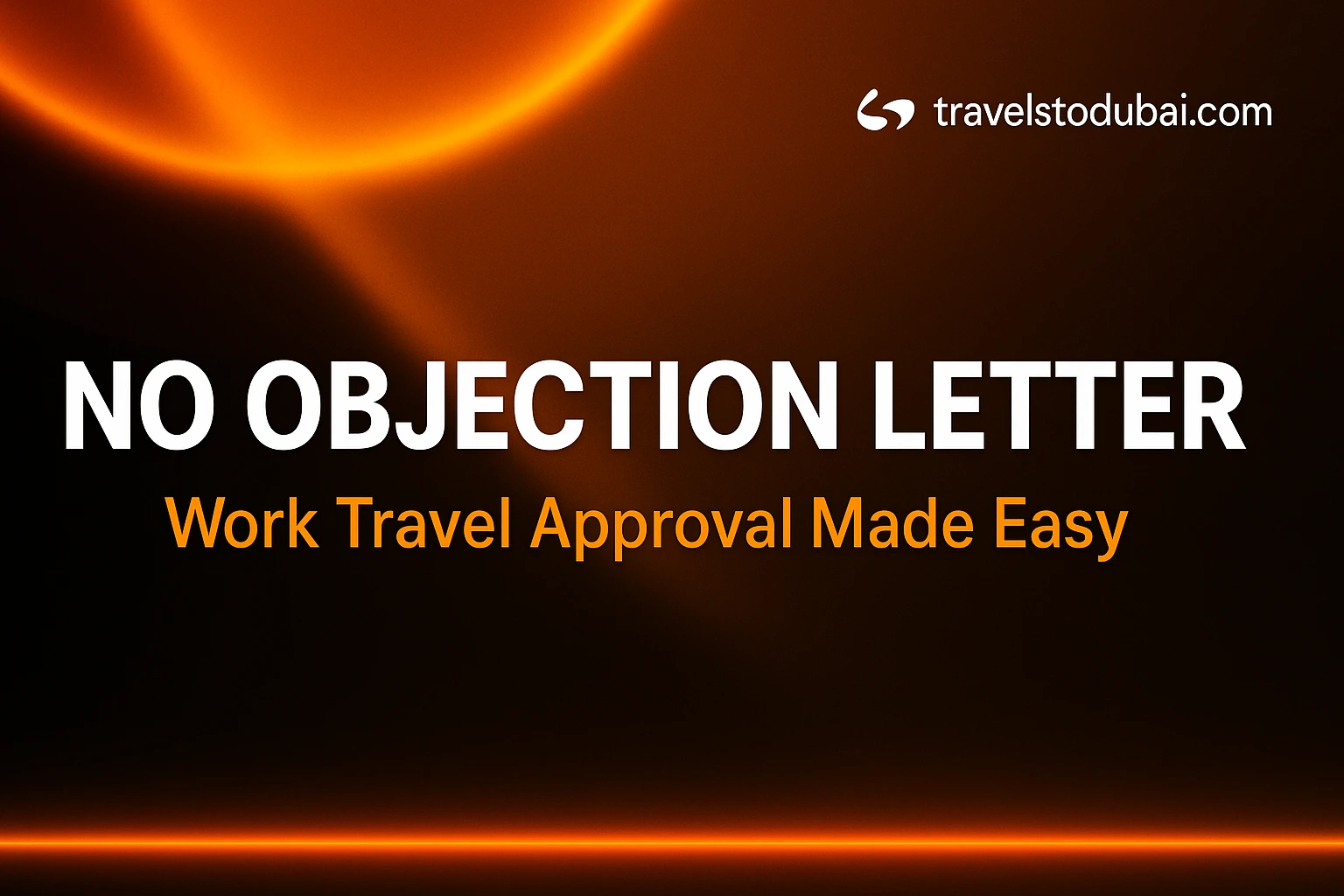Travel plans can be derailed by a single missing document. A no objection letter, sometimes called a No Objection Certificate or NOC, is a short formal statement from an employer, parent, sponsor, or authority that confirms they have no objection to a person traveling. Depending on the situation, it can be required by airlines, visa-issuing authorities, immigration officers, or embassy officials, and the exact format and supporting paperwork vary by country and purpose. This guide explains who issues a travel NOC, when you’ll need one, how to write one that works, and practical precautions to avoid last-minute problems.
What is a no objection letter for travel?
A no objection letter for travel is a written, signed declaration that the issuer does not object to the named person’s travel. Employers commonly issue NOCs for staff traveling on leave or applying for visas, schools and universities issue them for students, and parents or guardians create them for minors traveling alone or with a third party. For visa sponsorship, a host or sponsor may issue a NOC to confirm sponsorship of expenses and guarantee return. Because embassies, consulates, and carriers treat NOCs differently, the document’s precise language and attachments should match the authority’s requirements. High-authority consular templates exist for parental consent when children travel, and many visa guidance sites publish sample employer and sponsor letters to use as a baseline.
ALSO READ: https://travelstodubai.com/al-ain-travel-agency-booking-tips/
When you will likely need a travel NOC
You may be asked for a NOC when applying for a visa, if the airline wants proof that your employer or sponsor knows you are traveling, or when a minor travels without one or both parents. Some nations and specific routes enforce additional NOC rules; for example, recent incidents show travellers have been denied boarding or faced fines because of newly enforced NOC rules between certain countries and transit points. Always check the embassy, airline, and destination rules well before departure because the requirements can appear unexpectedly and enforcement can change rapidly.
Who should issue a no objection letter?
If you are an employee, your company or HR department should issue the NOC on company letterhead and include dates of approved leave, position, passport number, and a clear statement of “no objection” to travel. If you are a student, the school or university registrar issues the NOC confirming enrollment and approved leave. For children, parents or legal guardians must sign a parental consent/NOC and often get it notarized or attested; embassies commonly provide downloadable parental NOC templates. For sponsored visa applicants, the sponsor must supply identification documents and, where required, proof of legal residency or employment in the sponsor’s country. Official guidance and sample templates are widely available from embassy and visa service pages.
How to write an effective no objection letter for travel
Start with the correct heading and recipient line. For visa or embassy use, address “To: The Consulate/Embassy of [Country],” and include full contact details if available. State the purpose clearly in the first paragraph: name and passport number of the traveler, relationship to the issuer, travel dates, and destination. For employer-issued NOCs, mention the employee’s designation, date of joining, approved leave dates, and confirm the company has no objection to travel and expects them to return to work on a stated date. For parental NOCs, include the child’s name, passport number, travel itinerary, and the name and passport details of the accompanying adult, if any, and mention who will bear expenses. Always sign and date the letter; when required, place it on official letterhead and include a company stamp or apostille/notary authentication as required by the receiving authority. Use short, precise sentences and avoid ambiguous language. Sample employer and sponsor formats are widely available and can be adapted to match consulate requests.
Essentials to include in every travel NOC
Every effective NOC should contain the traveler’s full name as in the passport and passport number, exact travel dates, destination and purpose of travel, an explicit statement of “no objection” from the issuer, issuer’s full name and designation (or parental relationship), contact details, signature, date, and any official seal or letterhead. If the NOC supports a visa application, add any documents the embassy asks for, such as an employment contract, a salary certificate, proof of residence, or copies of passports and visas of sponsors. Missing or mismatched details are common causes of rejection, so double-check spelling, passport numbers, and travel dates before finalizing the letter.
Notarization, attestation, and timing
Some embassies and airlines require that a NOC be notarized or attested by a government authority. Parental consents for international travel frequently must be notarized and may need to be legalized or apostilled, depending on the destination. Employers will often print the NOC on official letterhead and stamp it, and that is sufficient for many visa offices; others may ask for a company stamp plus HR contact verification. As a rule, obtain the NOC as close as possible to the travel date while keeping enough time for any required attestation because some offices require it to be issued within a specified window, such as 30 or 90 days before application. Check the embassy or visa guidance for the destination to confirm timing and attestation rules.
Practical checklist before you travel
Before you leave, ensure you carry the original signed NOC and at least one clear photocopy. If the NOC supports a visa, file it with the visa application and keep digital scans. For minors, carry birth certificates, parents’ passports, and any custody documents in addition to the NOC. If your route includes transit through third countries, verify whether that transit country or airline requires additional consent forms for unaccompanied minors or guests traveling with third-party guardians. Airlines and embassies publish unaccompanied minor policies and required forms on their official sites; check those pages in advance to avoid denial of boarding.
When a travel NOC may not be enough
A NOC is not a visa, travel authorization, or guarantee of entry. Border officials and embassies retain discretion; a properly written NOC improves the chance of a smooth process, but cannot compel visa approval or admission. If you are traveling under special legal circumstances,s such as custody disputes, court orders, or where government permission is required for exit or re-entry, consult a lawyer or your embassy. Also, follow any recent country-specific alerts because governments occasionally change rules or add temporary NOC requirements that can affect re-entry or transit. Recent real-world examples show travellers being caught by newly enforced NOC rules during transit and incurring costs or missed flights. Always verify the latest guidance before travel.
Travel agency with Tabby payment and NOC support
Some travel agencies, especially those operating in the Gulf region, offer flexible booking and payment plans through services such as Tabby. When you book flights or packages through an agency that offers split payments, ask if they provide document-checking services or assistance obtaining a NOC for visas and minors. Agencies that help prepare visa files often know the specific NOC wording preferred by certain embassies and can speed up the process. If you need a notarized parental consent or an employer NOC, a reputable travel agent can point you to local notary services and embassy attestation procedures to keep everything compliant.
Tips and tricks to avoid problems
Obtain the NOC at least two to three weeks before travel for visa processing and attestation needs. Use exact passport details and avoid abbreviations. Keep both digital and printed copies in multiple places, and email copies to your emergency contacts. For minors traveling to or from countries with strict parental consent requirements, have both parents present for notarization or follow the embassy template precisely. If you are an employee, get the NOC on official letterhead with an HR phone number. If your travel involves transit through a country with recent NOC enforcement changes, confirm transit requirements directly with the airline and embassy, even if you already have a visa for the final destination. Carry contact information for the issuer and, if possible, a short supporting note from the issuer’s HR or institution verifying the letter’s authenticity.
Sample short employer NOC (adapt to your country’s needs)
[Provide a short, clear paragraph in your own letterhead that states your company or HR “has no objection” to the applicant’s travel, lists travel dates, and confirms approved leave and expected return to work. Include passport number, position, signature, date, and company stamp. Adjust wording if the embassy or airline provides a template.] For formal visa applications, use the embassy’s or host country’s recommended format when available.
Frequently asked questions
What is the difference between a no objection letter (NOC) and a visa?
A NOC declares that an employer, guardian, or sponsor does not object to travel, while a visa is an official immigration endorsement issued by a country permitting entry. The NOC may be required as part of a visa application, but it is not a visa itself.
Do airlines check NOCs at check-in?
Airlines can require NOCs, especially for unaccompanied minors or passengers traveling on certain residency statuses. Since airline policies differ, always check the carrier’s unaccompanied minor and document rules before departure.
Does a parental NOC need to be notarized?
Many countries and airlines require parental NOCs to be notarized, and some require further legalization or attestation. Use the embassy’s parental consent template when available and get the document notarized if the destination or carrier requests it.
How long before travel should I get an NOC issued?
If the NOC needs attestation or apostille, obtain it several weeks before travel. For straightforward employer letters printed on company letterhead, getting it within 30 days of travel is usually fine but verify the embassy’s window.
Can a self-employed person issue their own NOC?
Yes, a self-employed person can write a declaration of no objection, but embassies may ask for supporting business registration documents, bank statements, or notarization to verify the claim. Tailor supporting documents to what the visa office requests.
What happens if I’m denied boarding for lack of an NOC?
If denied boarding due to a missing NOC, you may incur rebooking fees and additional costs. Keep copies of official requirements and, where possible, obtain the missing document from the issuer quickly or consult your embassy for emergency help.
Final word
A carefully prepared no objection letter is a small document that can prevent large hassles. Treat it like a legal statement: be precise, put it on the correct letterhead when needed, get required notarization and attestation, and verify the latest rules for your itinerary. If you use a travel agency, ask whether they offer NOC preparation or document checks as part of their service and whether flexible payment options like Tabby are available to help spread costs. When in doubt, consult the embassy or airline directly. Accurate, up-to-date instructions will always trump generic templates.



